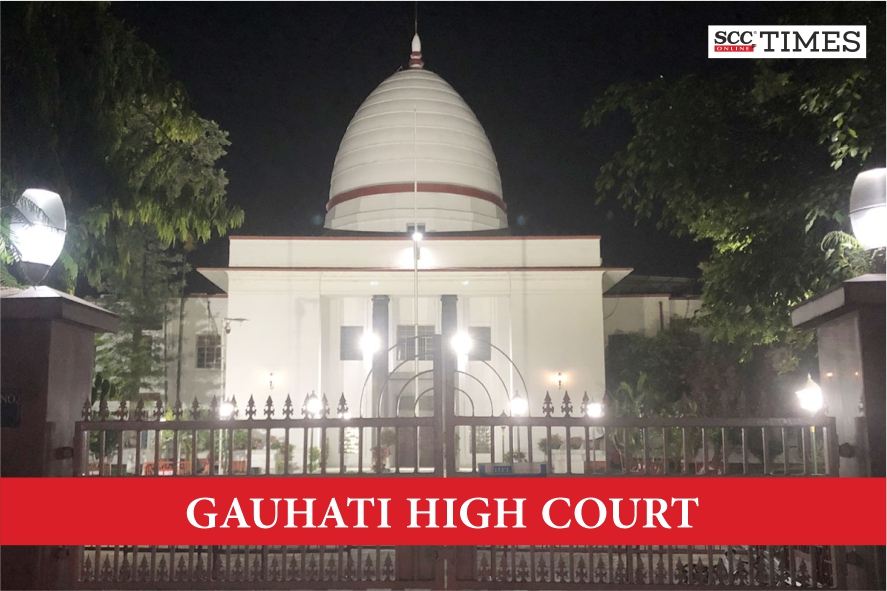Gauhati High Court: In a criminal revision petition filed by the convicts against the Appellate Court’s judgment upholding their conviction under Sections 3231 read with Section 342 of the Penal Code, 1860 (‘IPC’), the Single Judge Bench of Arun Dev Choudhury, J., allowing the petition held that it was a fit case for the grant of benefit under the Probation of Offenders Act, 1958 (‘the PO Act’) and directed their release on probation.
Background
The prosecution’s story was that on the day of the incident, the complainant’s son went to his school to collect rice supplied by the Government. The School Headmaster- convict 1 refused to give rice to the complainant’s son. When the complainant confronted the Headmaster, the Headmaster’s son-convict 2 abused the complainant by using filthy language and assaulted her with belt. The Headmaster also assaulted her with the belt, pushed her, and threatened her.
Accordingly, a complaint was filed, and the Trial Court took cognizance of the offence under Sections 3413, 323, 3544, 5065, and 34 of IPC against the convicts. The Trial Court convicted the Headmaster and his son. Aggrieved, the convicts filed an appeal but the Appellate Court upheld the Trial Court’s decision. Thus, the present revision petition was filed.
Analysis
Regarding the entitlement of the convicts under the PO Act, the Court reiterated that the PO Act was a milestone in the progress of the modern liberal trend of reform in the field of Penology. It was the result of recognition of the doctrine that the object of criminal law was more about the reformation of the offender than punishing him. In this regard, the Court relied on the case Ved Prakash v. State of Haryana (1981) 1 SCC 447, wherein it was held that sentencing an accused person was a sensitive exercise of discretion and not a routine or mechanical prescription acting on a hunch. The Trial Court should collect the material necessary to award a just punishment in the specific circumstances. It was further held that the social background and the personal factors of the offender were very relevant in this regard.
The Court also placed reliance on Sitaram Paswan v. State of Bihar (2005) 13 SCC 110, wherein the Supreme Court had laid down certain principles and considerations for the exercise of discretionary power under the PO Act. The Supreme Court had opined that while exercising discretionary power under the PO Act, the Courts have to consider the circumstances of the case, the nature of the offence, and the character of the offender. While considering the nature of the offence, the Court must take a realistic view of the gravity of the offence and the impact it had on the victim. It was further held that such power could be exercised by the Court even at the appellate or revisional stage or also by Supreme Court hearing appeal under Article 136 of the Constitution of India.
After perusal of the impugned judgment, the Court noted that the Appellate Court did not make any considerations under the PO Act, since such consideration is a right of the accused and duty of the Courts. The Court stated that a Court may not grant benefit in the given facts of a case, however, it must give consideration. Further, the Court noted that the Trial Court also did not grant the benefit under the PO Act to the convicts citing the manner of the commission of the offence. The Court opined that the Trial Court failed to consider the entitlement of the convicts to the benefit of the PO Act on the touchstone of the above stated principle.
Considering the facts, the Court said that the nature of the offence and manner in which it was committed could not be called heinous or premeditated as admittedly, there was a quarrel between the parties in 2004 for the non-delivery of rice to the complainant’s child by the School Headmaster. The Court also considered that the convicts had suffered for the last 20 years litigating and facing trial, appeal, and revision.
In view of the aforesaid and without entering into the merits, the Court held that it was a fit case for grant of benefit under the PO Act to the convicts in the exercise of its revisional power. Accordingly, the sentence of the convicts was modified to such effect. It was held that instead of sending the convicts to jail, they should be released on probation for good conduct under Section 4 of the PO Act.
The Court further directed the convicts to file two sureties worth Rs 20,000 along with personal bonds before the Trial Court, undertaking that they shall maintain peace and good behaviour for one year from the date of this judgment. The Court further directed that the Headmaster be given the benefit of Section 12 of the PO Act, and the conviction shall not affect his service/ pensionary benefit.
[Abdur Rahman Mandal v. Mosht Rukia Khatun, 2025 SCC OnLine Gau 12, decided on 06-01-2025]
Advocates who appeared in this case :
For the petitioner: MH Ahmed, Md. A Maleque, Misss Kanungoe, D C Nath, A S Choudhury, S K Sahariah, I Mozumder, and C Sharma
For the respondent: Additional Public Prosecutor KK Das, H Ahmed, Public Prosecutor F Begum, and A Sharif
Buy Constitution of India HERE
Buy Penal Code, 1860 HERE
1. Section 115(2) of the Bharatiya Nyaya Sanhita, 2023
2. Section 3(5) of the Bharatiya Nyaya Sanhita, 2023
3. Section 126(2) of the Bharatiya Nyaya Sanhita, 2023
4. Section
5. Section 351(2)/(3) of the Bharatiya Nyaya Sanhita, 2023








